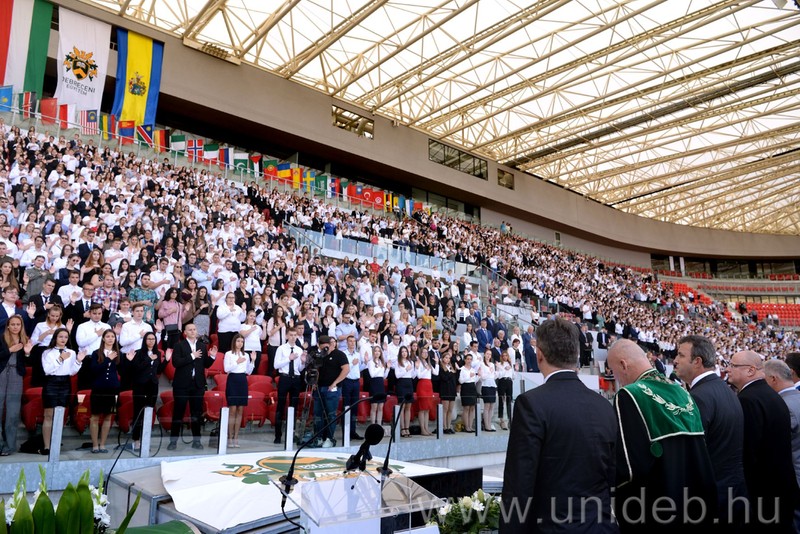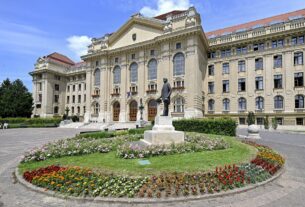“You have become part of the community of the University of Debrecen, which has forty thousand members; the friends and acquaintances you make in these defining years will be the basis of your network, and the five-hundred-year-old motto of the university will be accompanying you in your entire life. The institution, which has been operating uninterrupted since 1538, is an example of how knowledge, the future and development can only be ensured by diligence,” said Zoltán Szilvássy, rector of the University of Debrecen in his speech at the opening ceremony of the school year.
He added: during their studies, students can also get closer to industrial companies affiliated with the university; they can play an active role in research and development projects, and can master the ability to think and work together, in cooperation, in a dynamically developing world.
“The state has not released the hands of the universities,” said László Palkovics. As the Minister of Innovation and Technology explained, the state intends to cooperate with universities with an even higher aid intensity in the future.
He emphasized in connection with the University of Debrecen that the foundation model will increase the competitiveness of the institution, and as a result of the model change, the university’s self-financing capacity may increase, especially with business models emerging in connection with the development of the innovation park.
“The University of Debrecen offers the widest range of programmes in Hungary, combining tradition and innovation; its essential spirit is in harmony with the strategic goals of higher education in Hungary. We want a Hungary in which universities play a central role, not only by transferring knowledge, but also using it. Hungary is one of the Member States of the European Union that support the operability and innovation of the universities most intensively: in 2021, almost 1.2 percent of GDP is spent by the government on universities and by 2022, the HUF 650 billion allocation for higher education will be supplemented by an additional HUF 310 billion dedicated to university developments and science parks,” the minister said.
In his speech, György Kossa, chairman of the Board of Trustees of Count István Tisza Foundation for the University of Debrecen, spoke about the long-term goals of the University of Debrecen and reminded that the foundation as the maintaining entity will strive to ensure that the institution can fulfil a defining role also in the next five hundred years.
“The model change strengthens university autonomy, while economic and operational independence determines the present and future of the university. The University of Debrecen is a European and national treasure, and therefore it is a huge responsibility to lead such a modern, successful institution based on effective performance and knowledge, the goal of which is to provide a vision for the future based on performance, quality, value creation and professional vocation. The main competitors are universities abroad, and therefore, it is necessary to strengthen domestic and international research and social engagement, as well as to increase the number of qualified faculty members and the diplomas awarded. “It is a joint responsibility to preserve the knowledge that our predecessors have left to us during the last five hundred years,” said the chairman of the Board of Trustees.
Lajos Kósa, member of Parliament, stressed that education has always played a decisive role in Debrecen. As he recalled when everyone began to arm themselves after the lost battle of Mohács, they built a school in Debrecen, because they believed that education was the key to the future.
László Papp, mayor of Debrecen, welcomed the first-year students of the university, and expressed his wish that the focus point of this academic year should not be the pandemic, but the passing of the highest level of knowledge, the development of the university and the experiencing student life to the fullest extent possible.
Following the solemn oath, István Csont, president of the Student Government of the University of Debrecen, also welcomed the new citizens of the University. He said he was confident that that after nearly a year of distance education, normal weekdays could return, and recalled that the past period has made everyone aware that students also have a responsibility toward each other. At the opening ceremony, on behalf of the freshers, one student from each of the 14 faculties received their academic record books from their deans.
In the framework of the opening of the academic year, awards and other recognitions, as well as honorary doctorates were also given by the leaders of the university. The Council of the Faculty of Economics gave the Pro Facultate Juventutis Award, founded by the Faculty of Economics, to Anna Olasz, student in the sports economics master’s programme, silver medallist in world and European championships, and winner of the fourth place in long distance running at the Summer Olympics in Tokyo, in recognition of her achievements. The recognition was also given to Dóra Bodonyi, studying in the commerce and marketing bachelor’s programme, Olympic, world and European champion kayaker, as well as Luca Kozák, studying in the finance and accounting bachelor’s programme, Fair Play Prize winner hurdler. The Student Government of the University of Debrecen recognised the work of Péter Forisek, director general responsible for teacher training, with an “Alma Mater” memorial medal, for his many years of outstanding work in the interest of teacher trainee students. The Zsuzsa Juhász Award was given to Valéria Medvés, head nurse of the Department of Internal Medicine, who is actively involved in the theoretical and practical education of students coming to practice in the implementation of the measures put in place due to the risk of COVID-19 infection.
An Alumni Award was presented to Zsombor Marton, managing director of MOL Plc. The University of Debrecen gives the title of Doctor Honoris Causa to highly respected academics with outstanding achievements, which recognition was given this year to Professor Roland Laszig, whom the university thus received among its honorary doctors.
In the general and the supplementary procedures, a total of 7,553 students were enrolled at the University of Debrecen this year, which means that the number of new students, also including Hungarian students recruited from surrounding countries and international students enrolled into the English-language programmes is over ten thousand.
Press Office
unideb.hu


















